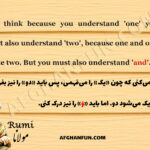Education: The System That Breeds Stupidity? (Russell’s View)
Men are born ignorant, not stupid. They are made stupid by education.
Bertrand Russell
Russell’s Paradox: How Education Can Create Ignorance
انسانها نادان به دنیا میآیند، نه احمق. آنها با آموزش اشتباه احمق میشوند.
برتراند راسل
مردم به طور طبیعی نادان به دنیا میآیند، نه احمق. آنها از طریق آموزشها احمق میشوند. این جمله نقدی است بر نظامهای آموزشی که ممکن است به جای پرورش تفکر مستقل و خلاقیت، به تقویت تفکرات قالبی و محدود بپردازند. در واقع، اشاره به این دارد که آموزش نادرست میتواند باعث محدود شدن ذهن انسانها و تقلیل تواناییهای آنها شود.
Is Education Making Us Stupid? Russell’s Controversial Claim
Инсонҳо нодон ба дунё меоянд, на аҳмақ. Онҳо бо таълим аҳмақ мешаванд.
Бертран Рассел
Мардум табиатан нодон ба дунё меоянд, на ахмақ. Онҳо тавассути таълим ахмақ мешаванд. Ин ҷумла интиқод аз низомҳои таълимиест, ки ба ҷои рушди фикри мустақил ва эҷодӣ, ба тавсеъаи фикрҳои стандартӣ ва маҳдуд мешавад. Дар асл, ишора мекунад, ки таълими нодуруст метавонад сабаби маҳдуд кардани зеҳни инсонҳо ва коҳиш додани қобилиятҳои онҳо шавад.
Born Ignorant, Made Stupid: What’s Wrong With Our Education?
يولد الناس جهلة، وليسوا أغبياء. التعليم هو ما يجعلهم أغبياء.
بيرتراند راسل
الناس يولدون جهلاء، لا أغبياء. هم يصبحون أغبياء من خلال التعليم. هذه العبارة تنتقد الأنظمة التعليمية التي قد تساهم في تقليص التفكير المستقل والإبداع، بدلاً من تعزيزه. في الواقع، تشير إلى أن التعليم غير السليم قد يؤدي إلى تقييد عقول الناس وتقليص قدراتهم.
This quote, “Men are born ignorant, not stupid. They are made stupid by education,” is provocative and suggests a critique of formal education or societal systems of knowledge dissemination. Here’s an analysis:
1. Distinction Between Ignorance and Stupidity
Ignorance: The lack of knowledge or awareness, which is a natural state at birth. It implies potential for learning and growth.
Stupidity: Often viewed as a lack of good judgment or the inability to think critically, which can be fostered or exacerbated by external influences.
The quote implies that ignorance is an innocent, rectifiable condition, but “stupidity” arises from flawed systems of learning or conditioning.
2. Critique of Education
The statement may criticize certain methods of education that suppress critical thinking, creativity, and individuality.
Instead of fostering wisdom, the system may impose rigid frameworks, dogmatic beliefs, or rote memorization, leading to a form of intellectual stagnation.
3. Philosophical Roots
This idea echoes sentiments from philosophers like Jean-Jacques Rousseau, who argued that society corrupts the natural state of humans, or John Dewey, who emphasized that education should cultivate thought, not merely transmit knowledge.
The quote also resonates with the warning of George Orwell about systems that manipulate individuals’ thinking through propaganda or flawed education.
4. Potential Irony
The phrase could be interpreted as ironic, provoking us to question how education—meant to empower—could instead diminish intellectual capacity.
It challenges the assumption that more education always leads to greater understanding, instead pointing to quality and method as crucial factors.
5. Relevance
In modern times, it applies to debates about: The effectiveness of standardized testing.
The impact of indoctrination versus fostering critical thought.
The consequences of misinformation or a lack of emphasis on analytical skills.
6. Broader Interpretation
Beyond formal education, the quote could also criticize how societal norms, media, or other cultural influences “educate” people in ways that stifle their innate potential and lead to poor decision-making.
Summary
This quote is a sharp critique of how systems of learning can fail to nurture human potential, turning natural ignorance into something far worse—stupidity. It invites reflection on how education can either liberate or constrain the human mind.
Bertrand Russell: A Titan of Philosophy and Logic
Bertrand Russell (1872–1970) was a British philosopher, logician, mathematician, historian, and social critic. He is widely regarded as one of the most influential intellectuals of the 20th century, contributing significantly to a variety of fields, including philosophy, mathematics, and political thought. Here is an overview of his life, works, and legacy:
Early Life and Education
Russell was born into an aristocratic family in Trellech, Wales, on May 18, 1872. Orphaned at an early age, he was raised by his grandparents under strict Victorian values. His intellectual curiosity led him to study mathematics and philosophy at Trinity College, Cambridge, where he excelled and began forming his foundational ideas about logic and the philosophy of mathematics.
Key Contributions
1. Philosophy of Mathematics and Logic
- Principia Mathematica (1910–1913): Co-authored with Alfred North Whitehead, this monumental work aimed to ground all of mathematics in formal logic. It introduced type theory and became a cornerstone for modern analytic philosophy and the development of computer science.
- Russell’s Paradox: He identified a fundamental issue in set theory, highlighting inconsistencies when considering the set of all sets that do not contain themselves. This paradox had profound implications for mathematics and logic.
2. Epistemology and Philosophy
- Russell explored the nature of knowledge, belief, and truth. His essay “On Denoting” (1905) revolutionized the philosophy of language, introducing the theory of descriptions, which influenced thinkers like Ludwig Wittgenstein.
- He advocated for logical positivism and empiricism, emphasizing the importance of evidence and logical reasoning.
3. Ethics and Politics
- Russell was a staunch advocate for freedom of thought, pacifism, and anti-imperialism. During World War I, he opposed Britain’s involvement, which led to his imprisonment.
- In later years, he championed nuclear disarmament, co-authoring the Russell-Einstein Manifesto in 1955, calling for the reduction of nuclear arms to ensure global survival.
4. Social Critique and Activism
- Russell was outspoken on issues of morality, religion, and social justice. His book Why I Am Not a Christian (1927) critiques organized religion and defends secular morality.
- As a humanist, he believed in using science and reason to improve human welfare and criticized blind adherence to tradition.
Awards and Honors
Russell received the Nobel Prize in Literature (1950) for his writings advocating humanitarian ideals and freedom of thought. His prolific body of work spanned over 70 books and thousands of essays, reflecting his deep intellectual curiosity and moral convictions.
Legacy
Russell’s influence extends across disciplines:
- Philosophy: He is regarded as one of the founders of analytic philosophy, shaping modern debates in logic, language, and epistemology.
- Mathematics and Computing: His work laid the groundwork for formal systems and inspired pioneers like Alan Turing.
- Ethics and Human Rights: Russell remains a symbol of intellectual courage, advocating for reason, peace, and human dignity.
Quotable Wisdom
Russell’s wit and wisdom are encapsulated in his quotes:
- “The good life is one inspired by love and guided by knowledge.”
- “War does not determine who is right — only who is left.”
- “The fundamental cause of the trouble is that in the modern world, the stupid are cocksure while the intelligent are full of doubt.”
Conclusion
Bertrand Russell was a towering figure whose intellectual and moral legacy continues to inspire. Whether through his groundbreaking work in logic, his critiques of social injustices, or his unwavering commitment to peace, Russell remains a beacon for those who value reason, freedom, and human progress.
External links:
This Bertrand Russell quote, found on “Brainy Quote” website.











